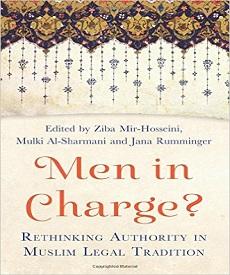पुस्तकें
Men in Charge? Rethinking Authority in Muslim Legal Tradition

Published Date:
Thursday 17th March 2016 Asia/Kolkata
Summary:
Synopsis
Muslim legal tradition does not treat men and women equally. At the root of this discrimination lies a theological assumption: God has given men authority over women. This assumption is justified with reference to a Qur'anic verse (4:34) and is expressed in two key legal concepts that underlie the logic of most contemporary Muslim family laws. One, qiwamah, generally denotes a husband's authority over his wife. The other, wilayah, refers to the right and duty of male family members to exercise guardianship over female members and the privileging of fathers over mothers in guardianship of their children.
Based on exciting new feminist research, Men in Charge? critically engages with this assumption and challenges male authority and gender discrimination from within the Muslim legal tradition. The authors trace how male dominance came to be inherent in the tradition, show how it is produced and sustained in contemporary times, and indicate how the tradition can be reformed in order to promote gender equality and justice.
The contributors are academics and activists from varied disciplines and backgrounds who were brought together by Musawah. Since its launch in 2009, Musawah has sought to produce new knowledge to support local and national movements as they develop and advocate for change.
Table of Contents
Foreword - Zainah Anwar
Acknowledgements
Note on Translation and Transliteration
Introduction - Ziba Mir-Hosseini, Mulki Al-Sharmani and Jana Rumminger
Muslim Legal Tradition and the Challenge of Gender Equality - Ziba Mir-Hosseini Read summary
The Interpretive Legacy of Qiwamah as an Exegetical Construct - Omaima Abou-Bakr Read summary
An Egalitarian Reading of the Concepts of Khilafah, Wilayah and Qiwamah - Asma Lamrabet Read summary
Producing Gender-Egalitarian Islamic Law: A Case Study of Guardianship (Wilayah) in Prophetic Practice - Ayesha S. Chaudhry Read summary
Islamic Law, Sufism and Gender: Rethinking the Terms of the Debate - Sa'diyya Shaikh Read summary
Qiwamah and Wilayah as Legal Postulates in Muslim Family Laws - Lynn Welchman Read summary
Islamic Law Meets Human Rights: Reformulating Qiwamah and Wilayah for Personal Status Law Reform Advocacy in Egypt - Marwa Sharafeldin Read summary
'Men are the Protectors and Maintainers of Women...': Three Fatwas on Spousal Roles and Rights - Lena Larsen Read summary
Understanding Qiwamah and Wilayah through Life Stories - Mulki Al-Sharmani and Jana Rumminger Read summary
The Ethics of Tawhid over the Ethics of Qiwamah - Amina Wadud Read summary
About the Contributors Read more
Index
Muslim legal tradition does not treat men and women equally. At the root of this discrimination lies a theological assumption: God has given men authority over women. This assumption is justified with reference to a Qur'anic verse (4:34) and is expressed in two key legal concepts that underlie the logic of most contemporary Muslim family laws. One, qiwamah, generally denotes a husband's authority over his wife. The other, wilayah, refers to the right and duty of male family members to exercise guardianship over female members and the privileging of fathers over mothers in guardianship of their children.
Based on exciting new feminist research, Men in Charge? critically engages with this assumption and challenges male authority and gender discrimination from within the Muslim legal tradition. The authors trace how male dominance came to be inherent in the tradition, show how it is produced and sustained in contemporary times, and indicate how the tradition can be reformed in order to promote gender equality and justice.
The contributors are academics and activists from varied disciplines and backgrounds who were brought together by Musawah. Since its launch in 2009, Musawah has sought to produce new knowledge to support local and national movements as they develop and advocate for change.
Table of Contents
Foreword - Zainah Anwar
Acknowledgements
Note on Translation and Transliteration
Introduction - Ziba Mir-Hosseini, Mulki Al-Sharmani and Jana Rumminger
Muslim Legal Tradition and the Challenge of Gender Equality - Ziba Mir-Hosseini Read summary
The Interpretive Legacy of Qiwamah as an Exegetical Construct - Omaima Abou-Bakr Read summary
An Egalitarian Reading of the Concepts of Khilafah, Wilayah and Qiwamah - Asma Lamrabet Read summary
Producing Gender-Egalitarian Islamic Law: A Case Study of Guardianship (Wilayah) in Prophetic Practice - Ayesha S. Chaudhry Read summary
Islamic Law, Sufism and Gender: Rethinking the Terms of the Debate - Sa'diyya Shaikh Read summary
Qiwamah and Wilayah as Legal Postulates in Muslim Family Laws - Lynn Welchman Read summary
Islamic Law Meets Human Rights: Reformulating Qiwamah and Wilayah for Personal Status Law Reform Advocacy in Egypt - Marwa Sharafeldin Read summary
'Men are the Protectors and Maintainers of Women...': Three Fatwas on Spousal Roles and Rights - Lena Larsen Read summary
Understanding Qiwamah and Wilayah through Life Stories - Mulki Al-Sharmani and Jana Rumminger Read summary
The Ethics of Tawhid over the Ethics of Qiwamah - Amina Wadud Read summary
About the Contributors Read more
Index



